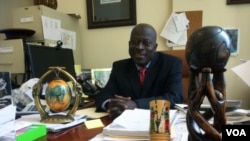With Ebola screening now underway at major U.S. ports, the threat of automatic quarantining and the possibility of an African travel ban, many in New York's African diaspora fear major economic repercussions here and in their homelands, as well as social ostracism, based on misinformation and panic about the virus.
For thousands of African immigrants in America, a travel ban between the United States and Africa could prove catastrophic, said community leader Kofi Boateng, the Ghanaian-American director of the West Harlem Development Corp.
“It means they themselves fear they may not be able to go back home to attend many important things, such as funerals and their businesses. A lot of the African diaspora is involved with business transactions back home and vice versa,” he said, adding that a travel ban "also means that even government officials who have to come and oversee trade missions and diplomatic activities and visit communities also can’t come."
Impact in Harlem
The Ebola scare has already affected livelihoods in Harlem. The district is dotted with braiding salons where women, mostly from West Africa, weave hair in the African style and apply hair extensions made from African hair. Boateng said these businesses have been losing customers at a growing rate over the past two months, even though many of the women working there have not visited their homelands for years.
Similarly, many West African taxi drivers report being shunned by New Yorkers who fear that the cab interiors may transmit the Ebola virus.
Neither fear is justified by the science. Yet despite repeated announcements from public health officials about how Ebola is transmitted, Boateng said the information does not seem to be getting through.
“So the Africans are afraid that when misinformation such as the travel ban and how you contract the disease takes hold, that before they know it their kids will be thrown out of school, [and] they themselves will lose their jobs.”]
Changing customs
Adding to the community's distress is the realization that traditional West African customs must be modified, at least for now. Treatment of the dead and dying is one arena, said Boateng, who is helping to organize local forums to inform his community, who may in turn educate loved ones back home.
In America, over two-thirds of deaths occur in hospitals and other institutional settings. The bodies are typically transported to funeral homes, where they are washed and prepared for burial. In Africa, by contrast, most people die at home, and it is customary for family and community members to touch, kiss, wash and bury the body themselves. But when a person has died of Ebola, contact with their body fluids puts mourners at high risk. Boateng and other leaders recommend that, for now, that custom should change.
They also warn about the extended handshaking that is deeply ingrained in African culture, especially at public events like weddings and funerals. These days, Boateng said, respectful eye contact and a wave must suffice. A publicity campaign in Nigeria advocated exactly that, and it seems to have changed people’s behavior.
Wider problem
Making these and other changes is a step forward, said Chika Onyeani, editor and publisher of the African Sun Times, a widely read diaspora newspaper. But he noted that battling the Ebola epidemic is no longer just Africa’s problem.
“Somebody died in Spain, somebody died in Germany and somebody died in the U.S.,” he said. “It’s a worldwide problem now. Let us all unite. Let us not stigmatize a group of people for what is happening.”
Indications of progress are mixed. On Friday, two Bronx schoolboys from Senegal were beaten up by fellow students yelling “Ebola!” and Manhattan’s Bellevue Hospital’s isolation ward admitted New York City’s first Ebola patient. The United Nations reported that an international fund it has set up to fight Ebola has collected just under half of its $1 billion goal.




